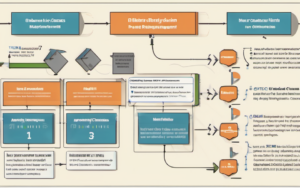The concept of blockchain emerged in the early 2000s, born from a desire to create a secure and transparent way to manage digital transactions. What started as a niche idea in tech forums has evolved into a transformative technology with the potential to reshape industries and economies worldwide. From its humble beginnings in the realm of cryptocurrency, blockchain has expanded its reach, touching upon various sectors, including finance, healthcare, and supply chain management.
Blockchain: From Humble Beginnings to Global Impact
The Genesis of Blockchain: A Tech Forum Innovation
The foundation of blockchain technology was laid in 2008 with the publication of a white paper by an anonymous individual known as Satoshi Nakamoto. This paper introduced Bitcoin, the first decentralized cryptocurrency, built on the principle of a distributed ledger. This ledger, known as blockchain, is a shared, immutable record of transactions that is replicated across a network of computers. This decentralized nature eliminates the need for a central authority, making it inherently secure and transparent.
Early Applications: Bitcoin and the Rise of Cryptocurrencies
Bitcoin’s emergence sparked a revolution in the financial world, introducing the concept of a decentralized digital currency. This innovative technology paved the way for the development of other cryptocurrencies, each with its unique features and applications. The early adoption of blockchain in the cryptocurrency space highlighted its potential for secure, transparent, and efficient transactions.
Beyond Crypto: Blockchain’s Expanding Horizons
Transforming Finance: Decentralized Finance (DeFi)
The application of blockchain technology extends far beyond cryptocurrencies. Decentralized finance (DeFi) is a rapidly growing sector that leverages blockchain to create new financial products and services, such as lending, borrowing, and trading. DeFi platforms operate autonomously, eliminating the need for intermediaries and offering users greater control over their finances. This approach promises to democratize access to financial services, empowering individuals and businesses alike.
Supply Chain Management: Enhancing Transparency and Efficiency
Blockchain’s inherent transparency and immutability make it an ideal solution for supply chain management. By recording every step of a product’s journey on the blockchain, businesses can ensure authenticity, traceability, and accountability. This enhanced transparency can help combat counterfeiting, improve inventory management, and streamline logistics processes. For example, blockchain can track the origin of food products, ensuring their safety and quality.
Healthcare: Secure Data Sharing and Patient Empowerment
The healthcare industry is increasingly embracing blockchain technology for its potential to revolutionize data management and patient empowerment. Blockchain can securely store and share patient records, facilitating efficient data exchange between healthcare providers while maintaining privacy and security. This technology can also enable secure and transparent drug tracking, reducing the risk of counterfeit medications and improving patient safety.
The Future of Blockchain: A World of Possibilities
Interoperability and Cross-Chain Solutions
As the blockchain ecosystem matures, interoperability becomes increasingly crucial. Cross-chain solutions allow different blockchains to communicate and interact with each other, enabling seamless data transfer and value exchange. This interconnectedness will foster collaboration and innovation, unlocking new opportunities across various industries.
Regulation and Adoption: Shaping the Blockchain Landscape
The future of blockchain depends heavily on its acceptance by regulatory bodies and institutions. Governments and financial regulators are actively exploring ways to regulate blockchain technology and its various applications. As regulations evolve and mature, blockchain adoption is expected to accelerate, paving the way for wider-scale implementation across industries.
The Impact on Society: A More Transparent and Equitable Future
The widespread adoption of blockchain has the potential to create a more transparent and equitable society. By providing immutable records of transactions and data, blockchain can enhance accountability and reduce fraud. Its decentralized nature can empower individuals by giving them greater control over their data and finances.
The journey of blockchain technology is a testament to its transformative power. From its humble beginnings in tech forums, it has emerged as a force that is reshaping industries and economies around the globe. As blockchain continues to evolve and mature, it promises to unlock new possibilities and create a more transparent, secure, and equitable future.




